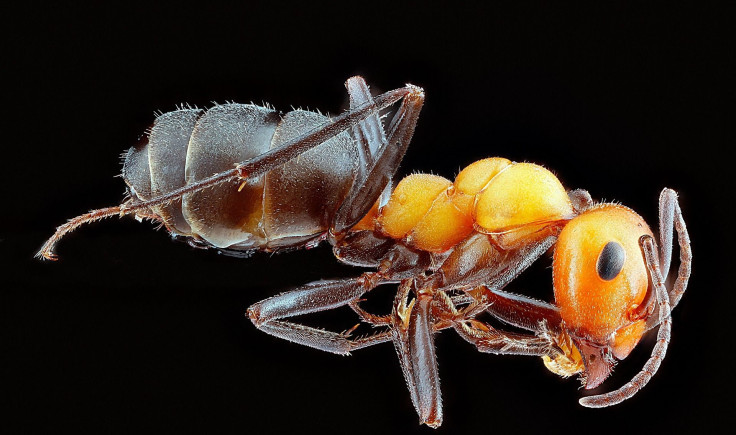Epigenetics: How Social Behavior Can Be Reprogrammed In Ants…And Possibly Humans, Too

While many believe behavior is largely defined by genetic makeup and environmental factors, new research suggests certain drugs can have a life-altering, permanent influence over an individual's character. The study, out of the University of Pennsylvania, experimented with changing the social behavior of Florida carpenter ants by injecting a drug into their brains, each one playing a different role in the colony.
Ant colonies are defined by castes, with minor ants growing up to become "food scouts" and majors developing into "worker guards." Researchers aren't entirely sure what triggers ants to become one or the other, as all ants in the colony share the exact same DNA and genetic makeup; as sisters, the female worker ants are all close to being identical twins. It would only make sense that something outside of natural genetic makeup — likely environmental or epigenetic influences — would cause certain social behaviors.
The researchers focused on epigenetics, which is the study of trait changes caused by external or environmental factors. Epigenetics involves examining how environmental influences turn genes on or off, and how cells read genes to manifest behavior. It provides insight into the huge impact that our life choices can have on DNA; some things that cause epigenetic changes in genes include smoking, stress, and weight.
"The results suggest that behavioral malleability in ants, and likely other animals, may be regulated in an epigenetic manner via histone modification," lead study author Daniel Simola, a post-doctoral researcher in the Penn department of cell and development biology, said in the press release.
'Nurture' In Molecular Terms
Nature vs. nurture is a common phrase that delineates the impact of both gene activity and environmental factors on how an organism turns out. However, scientists are still trying to comprehend how nurture manifests itself on a molecular level. The new study begins to provide a better picture of that.
The researchers treated different minor and major ants with drugs that either added or removed acetyl groups from histones, the proteins found in eukaryotic cell nuclei; they structure DNA into nucleosomes. Histones play a role in how genes are regulated, and thus have been pinpointed as one of the factors that define how carpenter ants behave. As enzymes and proteins aren't genetic factors, they offer clues into how behavior is programmed from epigenetic factors. One of the drugs used in the study was a bipolar disorder drug that hindered the enzyme histone deacetylase, getting rid of acetyl groups. But when other drugs made the ants began experience more histone acetylation, they became more minor — increasing their foraging processes.
"These results highlight the lasting influence of nurture over nature for complex traits like behavior, and how turning a few genes on and off via epigenetics can strangely affect an individual's character," Simola said in a video about the study (linked below).
Perhaps most interestingly, the researchers found that young ant brains were the most vulnerable to manipulation. Feeding young major ants the treatment with inhibitors caused them to behave like minor foraging ants for up to 50 days, hinting at an "epigenetic window of vulnerability."
What does this mean for humans? While the researchers would need to complete several more studies before making any significant conclusions, they note that studying ants is the perfect step in moving forward. Ants offer a "fantastic" model to explore epigenetic processes, Shelley Berger, another author of the study, said. The next step is using epigenetic manipulation to learn more about behavioral disorders in humans, and how even diet can influence behavior.
Ultimately, the study may lead to a new viewpoint on behavioral flexibility, that epigenetic changes can truly bridge the gap between nature and nurture. Ehab Abouheif, an evolutionary developmental biologist at McGill University in Canada, told Science Mag that the research is "a pioneering study establishing a causal link between epigenetic and complex social behavior. These mechanisms may extend far beyond ants to other organisms with social behavior."
Source: Simola D, Graham R, Brady C, Enzmann B, Desplan C, Ray A. Epigenetic (re)programming of caste-specific behavior in the ant Camponotus floridanus. Science. 2016.
Published by Medicaldaily.com



























